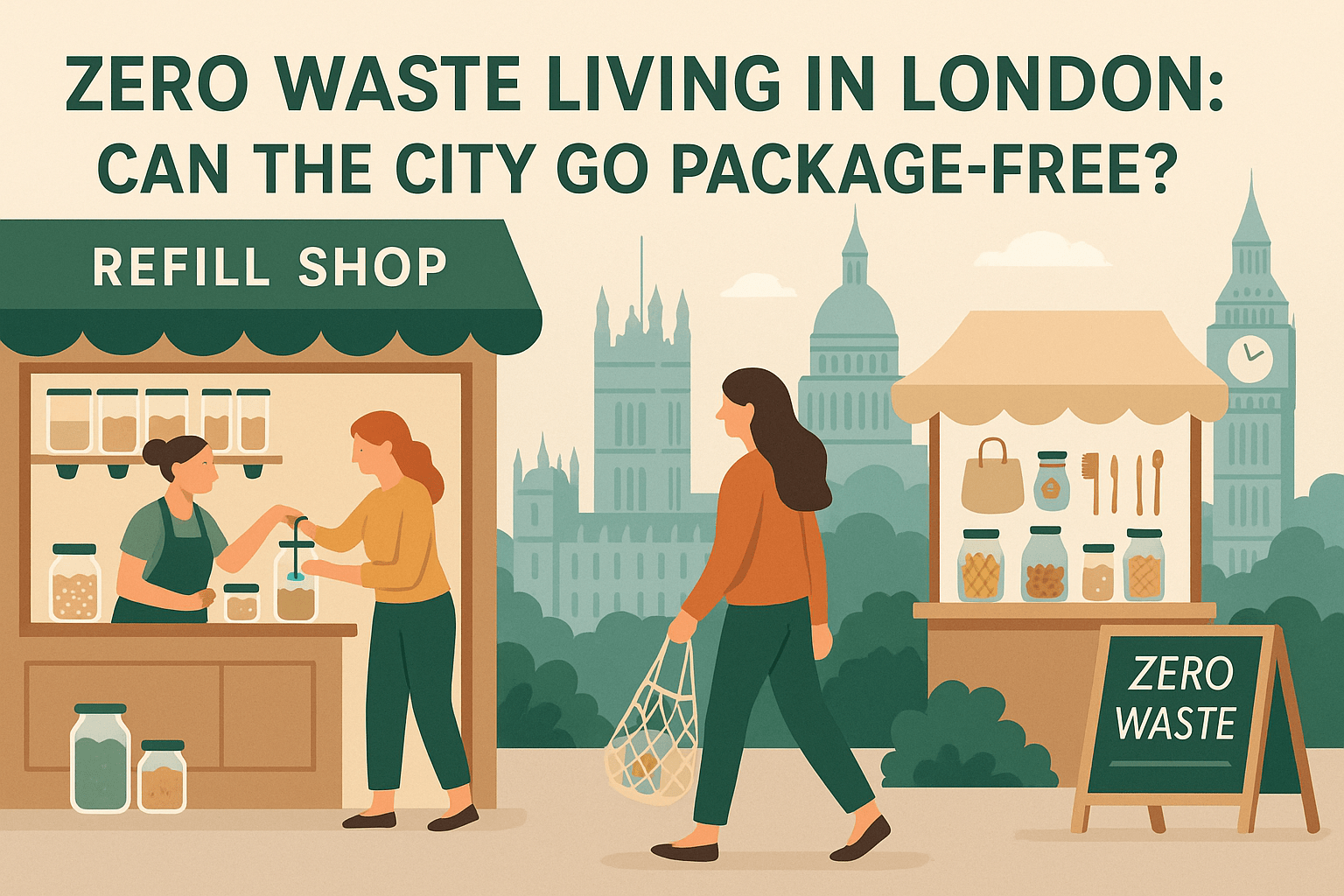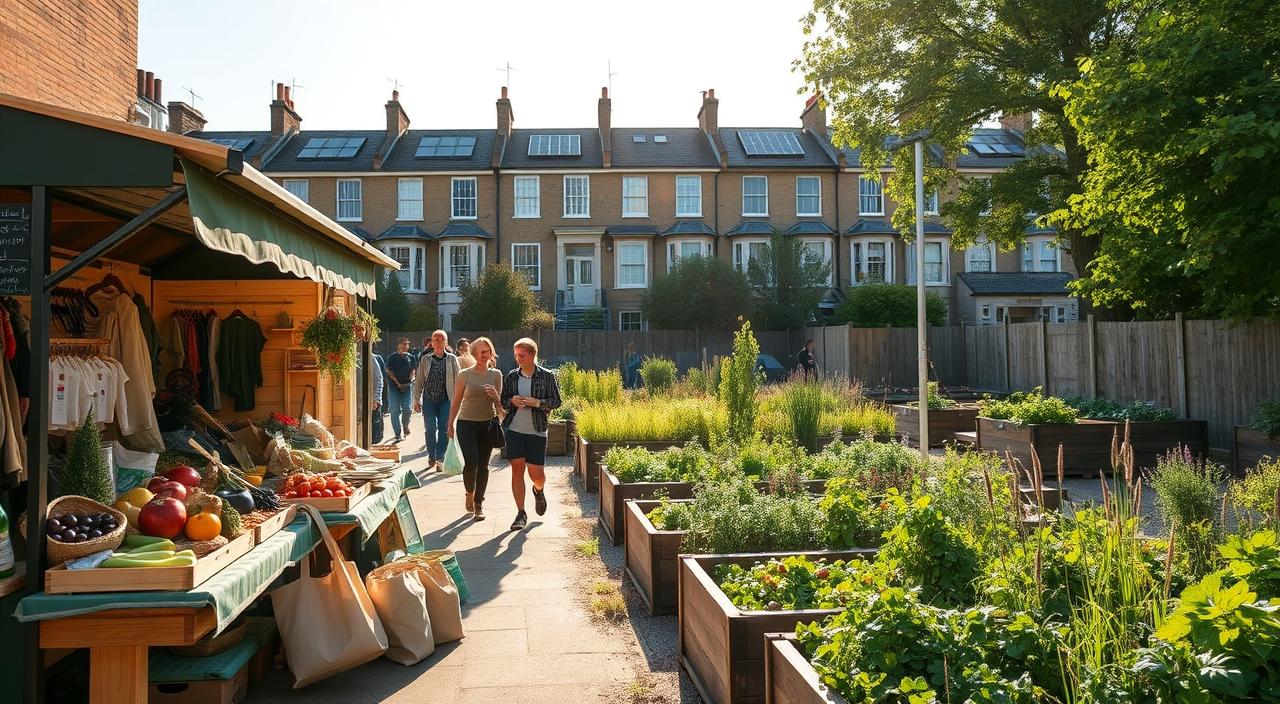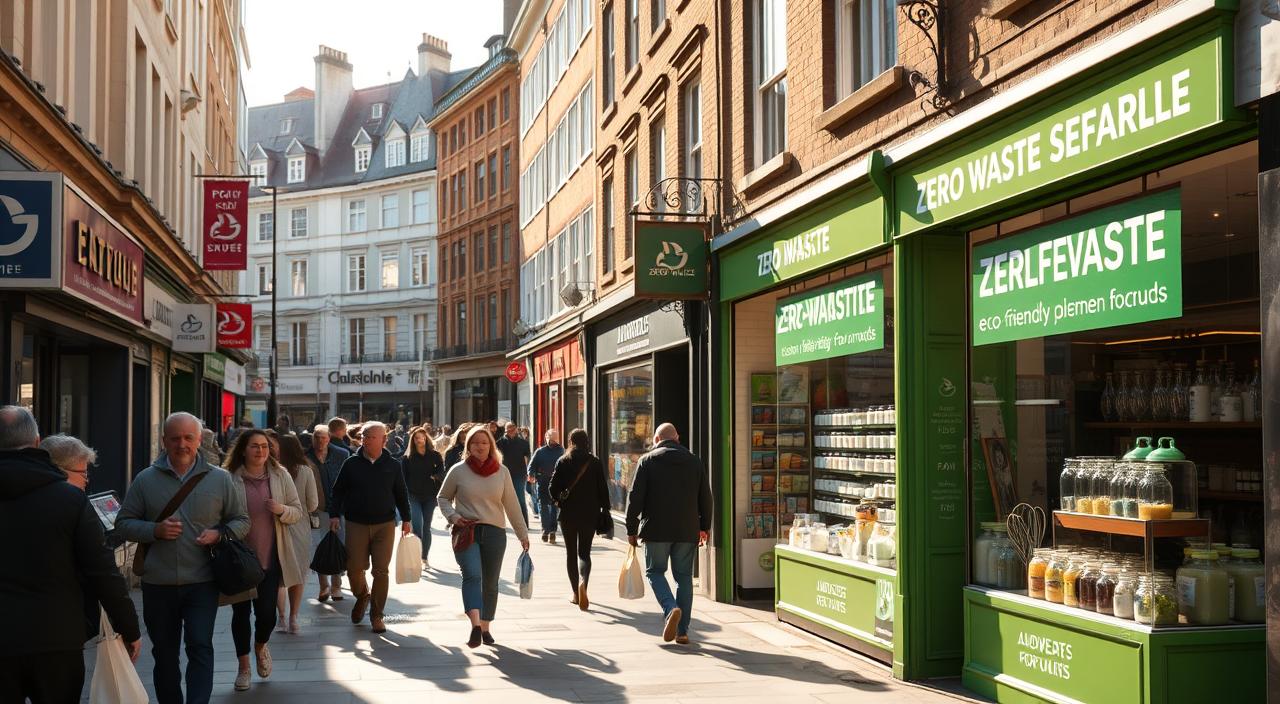
Adopting a low-waste lifestyle in a city as fast-paced as London comes with unique challenges – but also unique opportunities. The capital’s growing network of refill shops, sustainable markets, and eco-friendly suppliers is proving that zero waste living in London is not only possible but increasingly practical for households of all sizes.

From reusable container schemes to bulk-buy stations and community workshops, Londoners are finding ways to cut packaging waste without sacrificing convenience. However, the journey towards a fully sustainable lifestyle involves balancing environmental ideals with real-world constraints such as space, time, and cost of living.
Key Takeaways
- Refill shops across London make low-waste shopping more accessible, but they require preparation.
- Supporting independent ethical businesses benefits both the environment and the local economy.
- Small-flat living demands creative storage and container systems.
- Bulk shopping can offset initial costs over time.
- Council recycling policies differ widely between boroughs, affecting zero-waste strategies.
Understanding the Zero Waste Movement in London
The zero-waste philosophy challenges traditional consumption patterns by focusing on the “5 Rs”: Refuse, Reduce, Reuse, Recycle, and Rot. London’s movement began as a response to plastic pollution and the rise of disposable culture, with pioneers promoting reusable containers, package-free shopping, and sustainable product design.
Many city residents now combine refill shopping with other eco-friendly habits such as composting food scraps or choosing second-hand goods. Local councils, meanwhile, are slowly expanding recycling capabilities – although standards and accepted items still vary across boroughs.
The Best Zero Waste Shops in London

London’s refill stores go far beyond plastic-free groceries. Many offer toiletries, cleaning products, and sustainable household essentials, making it easier to reduce waste across all aspects of daily life.
| Shop Name | Location | Specialties |
|---|---|---|
| Gather | Peckham | UK-sourced food, cleaning products, community workshops |
| BYO | Tooting | Spices, oils, detergents, sustainable kitchen accessories |
| Refill Therapy | Hackney Wick & Stratford | Pantry goods, pet supplies, reusable container sales |
| Art of Zero Living | Greenwich Market | Organic snacks, bamboo toothbrushes, eco-friendly toiletries |
| Jarr Market | Herne Hill & Stoke Newington | Bulk pantry goods, natural dye workshops |
| Harmless | Crouch End | Vegan café, refill stations, locally sourced products |
These shops often work as social enterprises, reinvesting profits into environmental education or neighbourhood projects. Their community-oriented approach makes them more than just retail spaces – they’re hubs for local sustainability.
Everyday Swaps for a Lower-Waste Lifestyle
Adopting a zero-waste routine doesn’t have to happen overnight. Most successful Londoners start small, replacing single-use items with reusable alternatives and building new habits over time.
High-impact swaps include:
- Coffee & hydration: Use a reusable coffee cup and stainless steel water bottle.
- Grocery shopping: Bring cloth produce bags and beeswax wraps for fresh food.
- Kitchen storage: Replace cling film with glass jars or stainless steel containers.
- Bathroom essentials: Opt for shampoo bars, refillable soap dispensers, bamboo toothbrushes, and compostable floss.
Eco-Friendly Cleaning & Household Supplies
London’s refill network includes many shops offering concentrated cleaning solutions, which reduce packaging and cost less per use than traditional supermarket brands.
Popular refillable options include:
- Washing-up liquid
- Laundry detergent
- Multi-surface cleaner
- Toilet cleaner
Shops like Planet Organic and The Source Bulk Foods also provide refill stations for household essentials, often with loyalty discounts for regular customers.
The Role of Community in Zero Waste Living
Supporting small, independent shops keeps money circulating locally and reduces reliance on global supply chains.
Community benefits include:
- More jobs in local neighbourhoods
- Shorter supply chains reducing emissions
- Skill-sharing workshops, from fermenting vegetables to natural fabric dyeing
- Networking opportunities with like-minded residents
Retailers like Jarr Market and Harmless often host events that double as social gatherings, strengthening community bonds while promoting sustainability.
Storage Solutions for Small-Space Living
London flats rarely have the pantry space of suburban homes, so zero waste living in London often relies on creative container systems.
| Container Type | Best For | Capacity Options |
|---|---|---|
| Glass Jars | Grains, pulses, spices | 100ml – 2L |
| Stainless Steel Tins | Tea, coffee, baking supplies | 250ml – 1L |
| Breathable Fabric Bags | Fresh produce, bread | Various sizes |
| Airtight Bottles | Oils, vinegars, detergents | 500ml – 5L |
Using a first in, first out rotation helps keep food fresh and reduces waste, while smaller containers are ideal for flats with limited storage.
Innovation & Future Trends in London’s Zero Waste Scene
Zero-waste retail in the capital is evolving rapidly, with mainstream retailers starting to join the movement.
Examples include:
- The Body Shop: Nationwide refill stations for shower gels and shampoos.
- Holland & Barrett: Bulk dispensers for nuts and seeds.
- Marks & Spencer: Pilot refill stations for wine and cleaning products.
Digital tools are also changing how people shop:
- App-based refill reservations to avoid stock shortages
- Click-and-collect services for bulk pantry goods
- Smart weighing systems for accurate pricing
Challenges to Achieving a Fully Zero-Waste Lifestyle
Despite progress, barriers remain:
- Council inconsistencies: Recycling rules vary widely between boroughs.
- Time constraints: Working Londoners may struggle to plan refill trips.
- Initial investment: Reusable items can be more expensive upfront.
- Accessibility: Not all neighbourhoods have refill options nearby.
Conclusion
Zero waste living in London is no longer a fringe idea – it’s a growing movement supported by a diverse network of refill shops, community projects, and sustainable product innovations.
While challenges like space limitations, council recycling inconsistencies, and upfront costs persist, Londoners are finding creative ways to adapt. Every reusable coffee cup, refill jar, and plastic-free purchase helps push the city closer to a sustainable future.
With continued community engagement and support for independent eco-retailers, London could become a model for how major cities can drastically cut packaging waste without sacrificing convenience.

 CALL NOW
CALL NOW